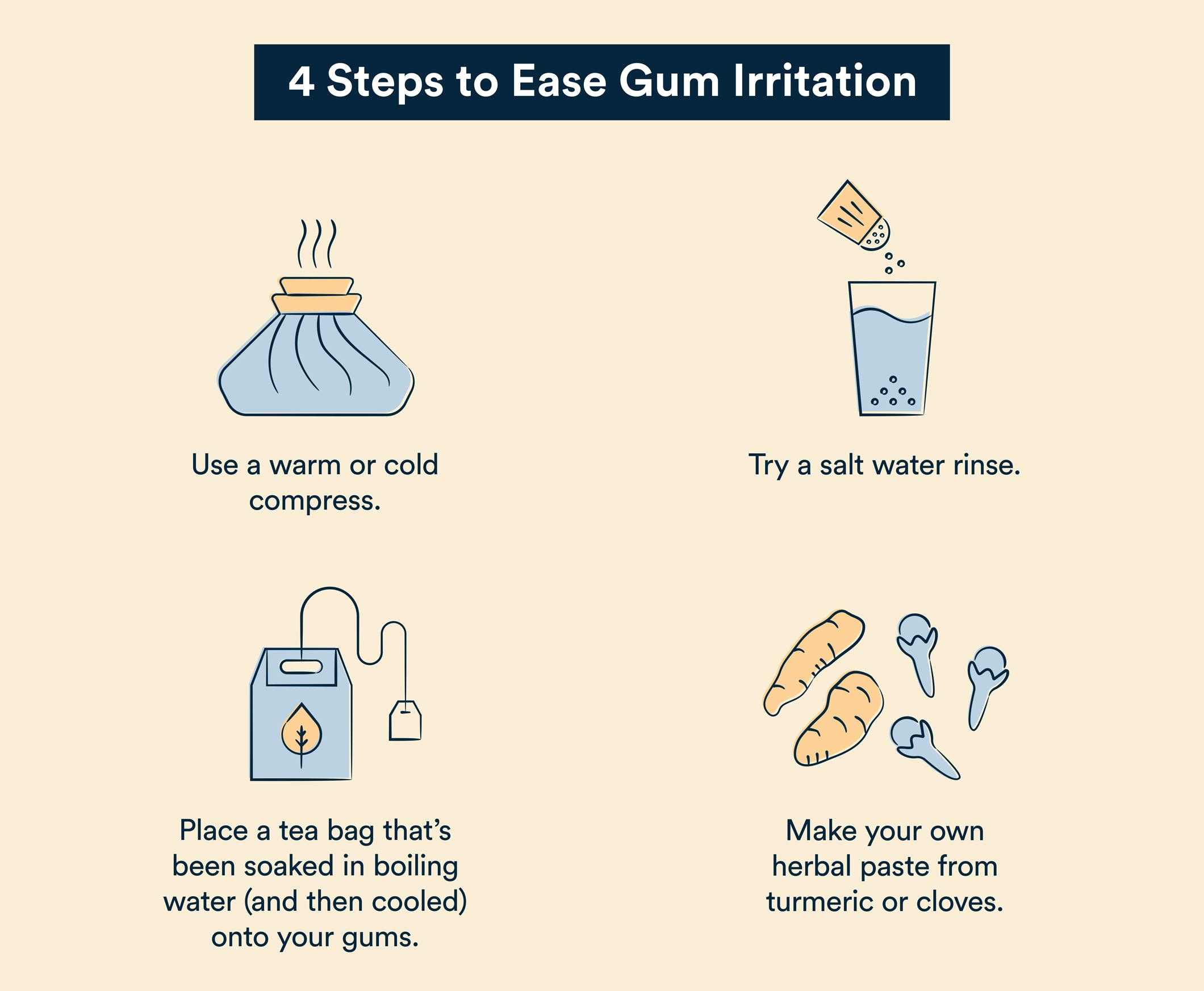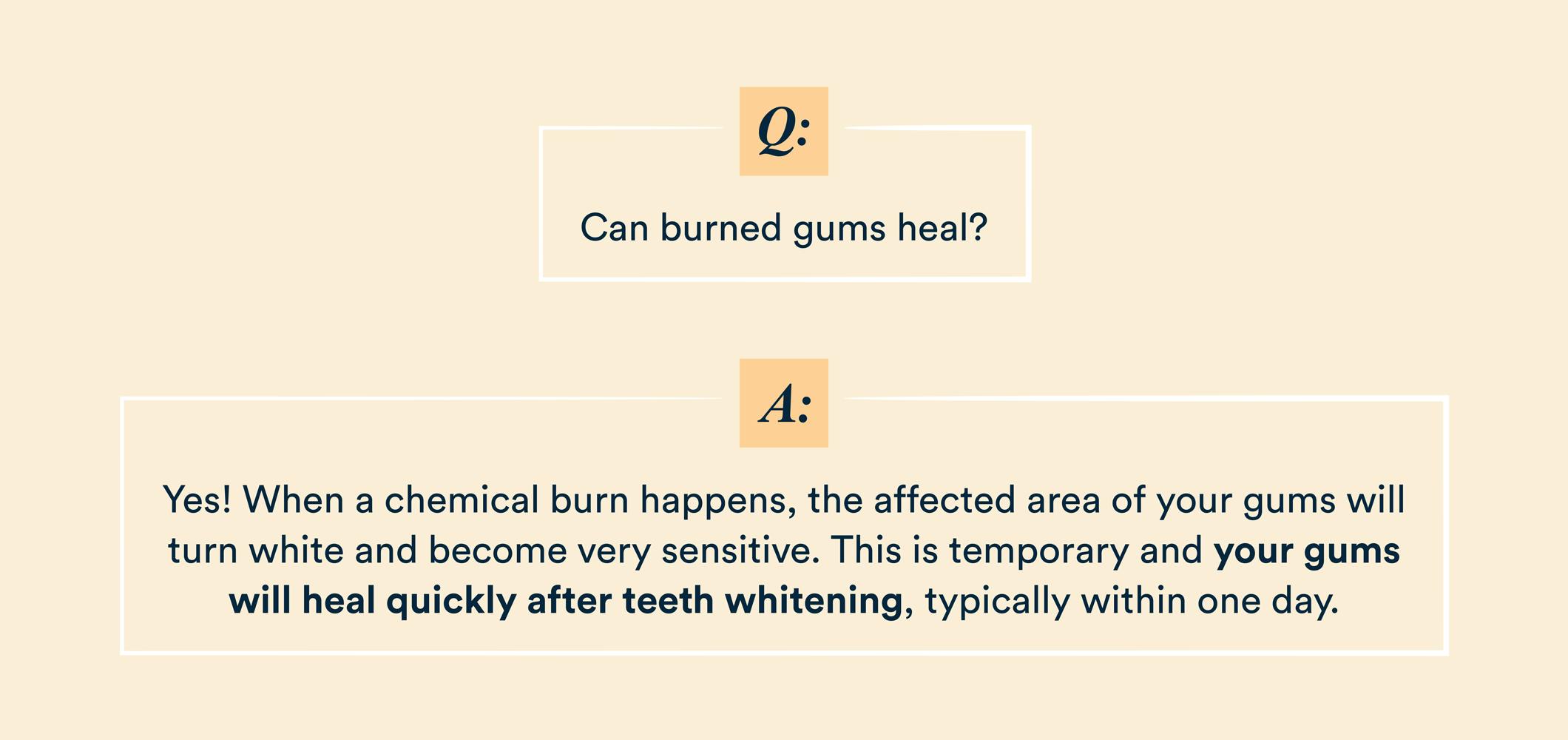When in Pain My Teeth Turn Grey but When I Feel Better They Turnwhite Again
What Causes Burned Gums From Teeth Whitening?
Hydrogen peroxide is one of the main ingredients in teeth whitening products, and it can often cause irritation or a burning sensation around the gums. While the amount of hydrogen peroxide included in teeth whitening products is safe to use, exposing your gums to this agent may lead to sensitivity or pain.
How To Prevent and Protect Burned Gums From Teeth Whitening
So how do you protect your gums when whitening your teeth? There are many steps you can take to minimize the uncomfortable side effects of teeth whitening and prevent burned gums from teeth whitening. Here are a few strategies to try:
- See your dentist before doing any at-home teeth whitening. If you're prone to teeth or gum sensitivity, consult with your dentist before using teeth whitening products. They can give you tips or point you toward products that may lessen sensitivity-related symptoms.
- Opt for a custom-fit whitening tray. One of the best ways to avoid teeth whitening products from seeping out of your tray and toward your gums is to opt for a custom whitening tray that will fit your mouth perfectly.
- Switch to a sensitivity toothpaste. Another step you can take to minimize irritation and pain around your gums is to switch to a sensitivity toothpaste.
- Reduce acidic food and drink in your diet. Acidic foods can amplify gum sensitivity and irritation. If you're experiencing pain in the gum area after teeth whitening, stay away from acidic food and drinks like coffee, wine, and citrus fruits like lemons and grapefruits.
- Carefully read instructions. Proper application of teeth whitening products — whether you're using a tray, strips, or a whitening pen — will significantly decrease your risk of burned gums from teeth whitening. Oftentimes, a rush to apply the product to your teeth or leaving teeth whitening products on for too long is what leads to that burning sensation or sensitivity.
- Remove any teeth whitening agent from gums. When applying your teeth whitening product, it's important that you keep the product on your teeth and avoid the gums. You can take a tissue and wipe away anything that gets too close to that area.
- Don't whiten every day. While it may be tempting to whiten your teeth as quickly as possible, too much whitening can cause damage to your teeth. If you use whitening products too often, it can wear away at your tooth enamel on the microscopic level, increasing the chance of sensitivity and decay.
4 Tips for Soothing Irritated Gums
If you've already used your teeth whitening product and you're experiencing sensitivity around your gums, there are a few things you can try to help lessen your pain and relieve irritation.
1. Warm and Cold Compresses
Applying compresses directly to your gums is a great way to relieve pain. You can choose to go with either a hot or cold compress, or you can switch from one to the other until your pain subsides.
To use a hot compress, run your water until it gets hot — but not scalding hot — and wet a clean cloth with the hot water. Wring out any excess water and place the cloth over your mouth where the pain is. For a cold compress, wrap an ice pack or ice cubes in a clean cloth and place it over the painful area of your mouth.
2. Salt Water Rinse
Salt water rinses are a great way to reduce inflammation in the mouth. The salt helps get rid of bacteria in your mouth and prevents further bacteria growth. We have a homemade salt water rinse recipe that you can make with just three ingredients.
3. Tea Bags
Using black or green tea (or any tea with astringent benefits), soak the tea bag in boiling water for at least five minutes. Then let the bag cool off so it's not boiling hot and place on top of your gums where the pain is. You could also use tea with anti-inflammatory properties such as chamomile or ginger tea.
4. Herbal Paste
Try making your own herbal paste to spread along your irritated gums using mouth-safe ingredients like turmeric or cloves. Turmeric is a bright yellow-orange spice that containscurcumin, which can help reduce inflammation and protect the mouth against gum disease and gingivitis. Cloves contain an ingredient that helps numb the nerves in your mouth temporarily, which will help provide relief from toothache or pain related to inflammation.
First, start with a powdered form of turmeric or clove and mix with a small amount of warm water. Mix until it forms a paste, adding more powdered turmeric,clove, or water until the consistency is just right. Apply some of the paste directly to the site of your gum pain. Leave the paste on for a few minutes and then rinse it away, being careful not to swallow any of the paste.

How To Fix Bleached Gums From Teeth Whitening
One of the best things you can do to fix bleached gums from teeth whitening is to take a break from using teeth whitening products. If you're wondering why your gums turned white from teeth whitening products, the simple answer is that a mild type of chemical burn has occurred.
While a chemical burn may sound scary, there are different types of chemical burns. Those caused by teeth whitening are similar to a sunburn but along your gums. And instead of your skin turning red or pink, your gums will turn a white color.
The irritated area of the gum will typically turn white around the edges and eventually flake off. However, the tissue will return to normal within a day. If you experience prolonged gum sensitivity or pain after whitening your teeth at home, schedule an appointment with your dentist.
Can Burned Gums Heal?
Yes, burned gums from teeth whitening can — and will — heal. If teeth whitening agents come in contact with the gums, it can result in a chemical burn. The gums may turn white and become very sensitive. The good news is that these burns are temporary and heal quickly after teeth whitening, typically within one day.

Can I Whiten My Teeth if I Have Gum Disease?
If you have gum disease such as gingivitis or periodontitis, it's important that you consult with your dentist before doing any at-home teeth whitening. This is because your gums are already sensitive, and exposing your mouth to the ingredients in teeth whitening products will likely cause additional pain and damage to your gums.
Best Teeth Whitening for Sensitive Gums
If your issue is simply tooth stains from things like coffee or nicotine instead of tooth enamel discoloration, you may want to initially use whitening toothpastes or try natural methods such as baking soda to see if they help.
These products usually do not irritate the gums. Just be aware that such products are great at removing stains from the outside of the teeth, but do not actually change the color of the tooth enamel itself.
If these methods are unable to get you the bright smile you desire, then consider stepping up to an at-home product like our teeth whitening kit.
There are many available options when it comes to teeth whitening. In general, the stronger, more aggressive the whitening method, the more potential there is for irritation or sensitivity.
Bottom Line: Carefully Following Teeth Whitening Directions Will Help You Avoid Burned Gums
While teeth whitening will not cause permanent damage to your gums, irritation is a common symptom for many who use teeth whitening products. It's important to carefully read directions and apply your teeth whitening products carefully to ensure the product stays on your teeth and doesn't travel to your gums.
The journey to whiter teeth doesn't need to be painful. Look out for signs of irritation and take a break from your whitening regime if you experience any of the gum sensitivity symptoms we talked through above, getting back to it only once they've healed.
Source: https://auraglow.com/blog/burned-gums-teeth-whitening/
0 Response to "When in Pain My Teeth Turn Grey but When I Feel Better They Turnwhite Again"
Post a Comment